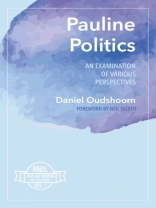The Pauline Epistles have been claimed as a useful ally by parties across the political spectrum. Neoconservatives claim that Paul and his coworkers were law-abiding, authority-honoring, devoutly religious people oriented around their respect for hard work, private property, and family values. Liberals claim that the Pauline faction was devoted to the celebration of diversity, internally transcending social markers of status, and the embrace of peace. Radicals claim that Paul was a leader within an anti-imperial revolutionary movement sweeping across the eastern portion of the Roman Empire. However, it is rare for these (and still other!) parties to engage in dialogue with each other because each party tends to operate with presuppositions that make open engagement difficult. Pauline Politics examines the main positions taken in relation to Paul and politics and then engages in a thorough examination of the underlying arguments used to argue that this-or-that position is more or less plausible. Underlying arguments tend to relate to two things: first, positions on the socioeconomic status of Paul, his coworkers, and other early Jesus loyalists; and second, positions on Pauline eschatology. This volume will comprehensively explore these matters.
O autorze
Neil Elliott is an Episcopal priest and a New Testament scholar (Ph D Princeton Theological Seminary) ) who has taught biblical studies, early Christian history, world religions, and American civil religion at the College of St. Catherine and Metropolitan State University. He is the author of The Rhetoric of Romans (1990), Liberating Paul (1994), The Arrogance of Nations (2008), and, with Mark Reasoner, Documents and Images for the Study of Paul (2010).







![Pokrywa Brian Schrag & Julisa Rowe: Community Arts for God's Purposes [Chinese] 貼近神心意的社群藝術 Pokrywa Brian Schrag & Julisa Rowe: Community Arts for God's Purposes [Chinese] 貼近神心意的社群藝術](https://static.worldofdigitals.com/thumb_webp/740/9781645083740.webp)




